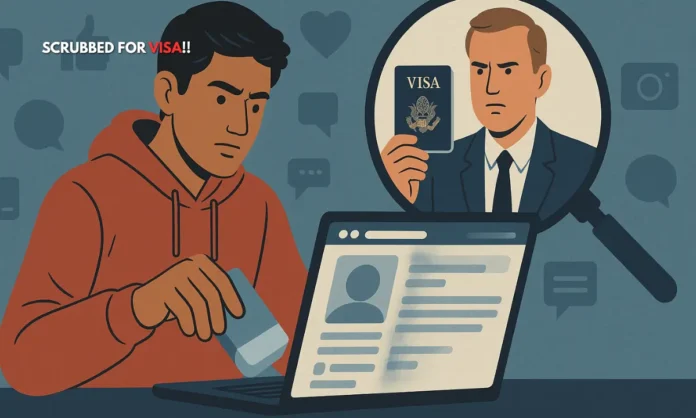Summary
- US visa applicants in Bengaluru are deleting politically or religiously sensitive content and curating “neutral” profiles to avoid rejections.
- New rules mandate listing all social media usernames from the past five years on DS-160 forms for F, M, and J visas.
- Education consultancies in the city report a surge in student queries about online behavior, reflecting growing anxiety over digital footprints.
Fear of the Feed: Why Bengaluru Students Are Deleting Their Digital Histories
As the United States tightens its visa screening procedures, particularly for international students, a quiet but sweeping purge is underway in Bengaluru’s student community. Social media timelines that once buzzed with political opinions, protest selfies, and cultural commentary are now being methodically scrubbed. What’s left is a sanitised online persona curated not for peers, but for the eyes of US visa officers.
On June 23, the US Embassy in India confirmed that all applicants for F, M, and J non-immigrant visas must publicly disclose their social media usernames from the last five years on the DS-160 visa form. The implication is clear: anything posted, liked, or followed online can now be grounds for visa denial or future ineligibility.
This change has triggered an atmosphere of digital paranoia, particularly in Bengaluru, where thousands of students each year aspire to study in American universities. The result? A city-wide digital clean-up drive where memes are out, mindfulness quotes are in—and dissent is being quietly deleted.
🚨 BREAKING: WANT A U.S. STUDENT VISA? MAKE YOUR SOCIAL MEDIA PUBLIC – OR GET DENIED.
— HustleBitch (@HustleBitch_) June 25, 2025
You now have to make ALL your socials PUBLIC – or get denied.
No privacy. No entry.
Policy just dropped. Effective immediately. pic.twitter.com/fG3hKDeUw1
Censoring the Self: How Students Are Rewriting Their Online Identities
- Students are deleting political content, unfollowing activist accounts, and asking friends not to tag them in controversial posts.
- Some are curating feeds to highlight hobbies, travel, tech updates, and academic achievements only.
- Consultancies report parents are heavily involved, urging caution and advising transparency on old accounts.
Bengaluru student applicants are taking no chances. One applicant to a US undergrad economics program admitted he has halved his social media activity and deleted all posts related to protests or political satire. “My Instagram is now just books, music, and dogs,” he said.
For another prospective computer science grad student, the visa application meant scrolling through years of old posts and removing anything remotely critical of government—Indian or American. “I now follow mostly academic, travel, or cooking pages,” she explained, admitting she’s even reviewing her LinkedIn likes.
Aditya K, who secured his visa before social media became central to screening, noted the spike in anxiety among his peers: “People are ‘unliking’ reels, deleting memes, and avoiding anything that might suggest they’re politically active—even if it was just humor.”
Education consultancies are fielding panic calls from parents and students alike. Uma Aswani of Dollars Colony notes, “It’s not new that the US checks social media, but the process is now universal, not random.” Her team has been advising students on managing their digital footprints since 2022, especially after Trump’s attempted restrictions on international students.
Surveillance Anxiety: Bengaluru’s High Compliance and the Parental Factor
- 85% of students in Bengaluru comply with online conduct recommendations, say consultants.
- Many students are avoiding even neutral topics like global protests, war updates, or religious debates.
- The visa interview process has become lengthier and more probing under Biden’s administration.
According to Rakesh S Malagithi from Study Next Overseas, parental involvement is a major factor behind Bengaluru’s unusually high rate of compliance with social media “clean-up” norms. He also flagged that visa interviews, once 2-minute formalities, now stretch to 7–8 minutes, covering everything from academic intent to online behavior.
Mamta Shekhawat of Gradding.com says students are advised to “scrub” their profiles of hardline political views, religious commentary, and criticism of the US. Instead, they are encouraged to highlight volunteer work, leadership roles, awards, and family-friendly travel snaps.
Even seemingly apolitical students are second-guessing past content. “A meme I posted on climate protests suddenly felt risky,” one student said. “I deleted it, just in case.”
Binita Parekh’s consultancy on Dickenson Road has incorporated digital footprint discussions into their first student meeting. “We tell students that being honest about old accounts is better than hiding them. But we also tell them what’s worth deleting.”
Digital Footprints and the Future: A New Normal for Global Mobility
The new US visa norms are more than bureaucratic shifts—they are signs of a changing global order where borders are not only geographic but algorithmic. While the official reason behind social media screening is national security, critics argue it also signals a deeper intolerance of political expression.
The bigger question is whether this level of scrutiny will normalize self-censorship. When students start deleting who they were to qualify for who they want to become, what does that mean for academic freedom or personal authenticity abroad?
In Bengaluru, the message is sinking in: the passport to America now comes with an invisible appendix—your digital self. And for many, that self is now being edited with extreme caution.


